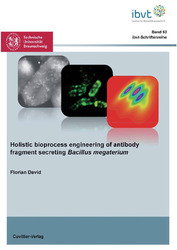| Areas | |
|---|---|
| Serie de libros (97) |
1381
|
| Nachhaltigkeit |
3
|
| Gesundheitswesen |
1
|
| Letra |
2369
|
| Ciencias Naturales |
5408
|
| Matemática | 229 |
| Informática | 319 |
| Física | 980 |
| Química | 1364 |
| Geociencias | 131 |
| Medicina humana | 243 |
| Estomatología | 10 |
| Veterinaria | 108 |
| Farmacia | 147 |
| Biología | 835 |
| Bioquímica, biología molecular, tecnología genética | 121 |
| Biofísica | 25 |
| Nutrición | 45 |
| Agricultura | 1005 |
| Silvicultura | 201 |
| Horticultura | 20 |
| Ecología y conservación de la tierra | 148 |
| Ciencias Ingeniería |
1795
|
| General |
98
|
|
Leitlinien Unfallchirurgie
5. Auflage bestellen |
|
Erweiterte Suche
Holistic bioprocess engineering of antibody fragment secreting Bacillus megaterium (Volumen 63) (Tienda española)
Florian David (Autor)Previo
Indice, Datei (75 KB)
Lectura de prueba, Datei (390 KB)
Antibodies and antibody fragments are most important tools for therapeutic and diagnostic
applications. An increasing demand of these high potential drugs makes less cost
intensive production systems most desirable. Compared to mammalian cell culture
microbial production platforms are beneficial with regards to reaching high production
titers, scale up approaches, regulatory aspects and reduced costs of goods. Amongst
these production systems those that are having the ability of an additional product
secretion are most advantageous as the downstream processing costs are decisively
reduced.
In this work Bacillus megaterium, as a Gram positive model organism, was used to
extensively study the production and secretion of the antibody fragment D.13 scFv. For
the bioprocess optimization a holistic approach was followed. First the aim was to
establish a high productive defined cultivation medium. Different media components like
carbon sources, metal ions and ammonium concentrations were screened throughout
various cultivation platforms ranging from micro titer plates to shaking flasks. Statistical
design of experiments and a genetic algorithm approach were used to establish an
appropriate defined high production medium. As a second step the process was transferred
to the bioreactor scale of several liter cultivation volume. An optimal bioprocess
strategy based on alternating growth and starvation phases was established to gain high
product titers of antibody fragment D1.3 scFv. As a final step an up-scale to a 100 L
bioreactor was done accounting for an advanced process control and considering “good
manufacturing practice” guidelines. The advanced bioprocess monitoring tool of flow
cytometry was used to gain deeper insights on microbial physiology at single cell level
regarding cell viability, cell integrity and production intensity. This knowledge was used for
a sophisticated cell physiology based bioprocess development and optimization. Furthermore
culture heterogeneities were measured and characterized for B. megaterium
producing antibody fragment D1.3 scFv under controlled bioreactor conditions. To obtain
additional information about the regulatory processes occurring inside the cell on gene
expression level a transcriptome analysis was performed comparing cells with an
increased production and secretion status to less producing and non-producing cells.
These cutting-edge technologies of flow cytometry and transcriptome analysis revealed
possible bottlenecks of the overall bioprocess’ performance and product secretion of
antibody fragments with B. megaterium as production platform and form a robust basis for
rational strain optimization and advanced process designs.
| ISBN-10 (Impresion) | 3954041154 |
| ISBN-13 (Impresion) | 9783954041152 |
| ISBN-13 (E-Book) | 9783736941151 |
| Formato | A5 |
| Idioma | Inglés |
| Numero de paginas | 160 |
| Laminacion de la cubierta | mate |
| Edicion | 1 Aufl. |
| Serie | Schriftenreihe des Institutes für Bioverfahrenstechnik der Technischen Universität Braunschweig |
| Volumen | 63 |
| Lugar de publicacion | Göttingen |
| Lugar de la disertacion | Technische Universität Braunschweig |
| Fecha de publicacion | 25.05.2012 |
| Clasificacion simple | Tesis doctoral |
| Area |
Biología
Bioquímica, biología molecular, tecnología genética Ingeniería mecánica y de proceso |
| Palabras claves | Antikörperfragment, Sekretion, Bacillus megaterium, Medienoptimierung,Bioprozessoptimierung, Maßstabsvergrößerung, Einzelzellanalyse, Transkriptomassay,Produktionsengpässe |








